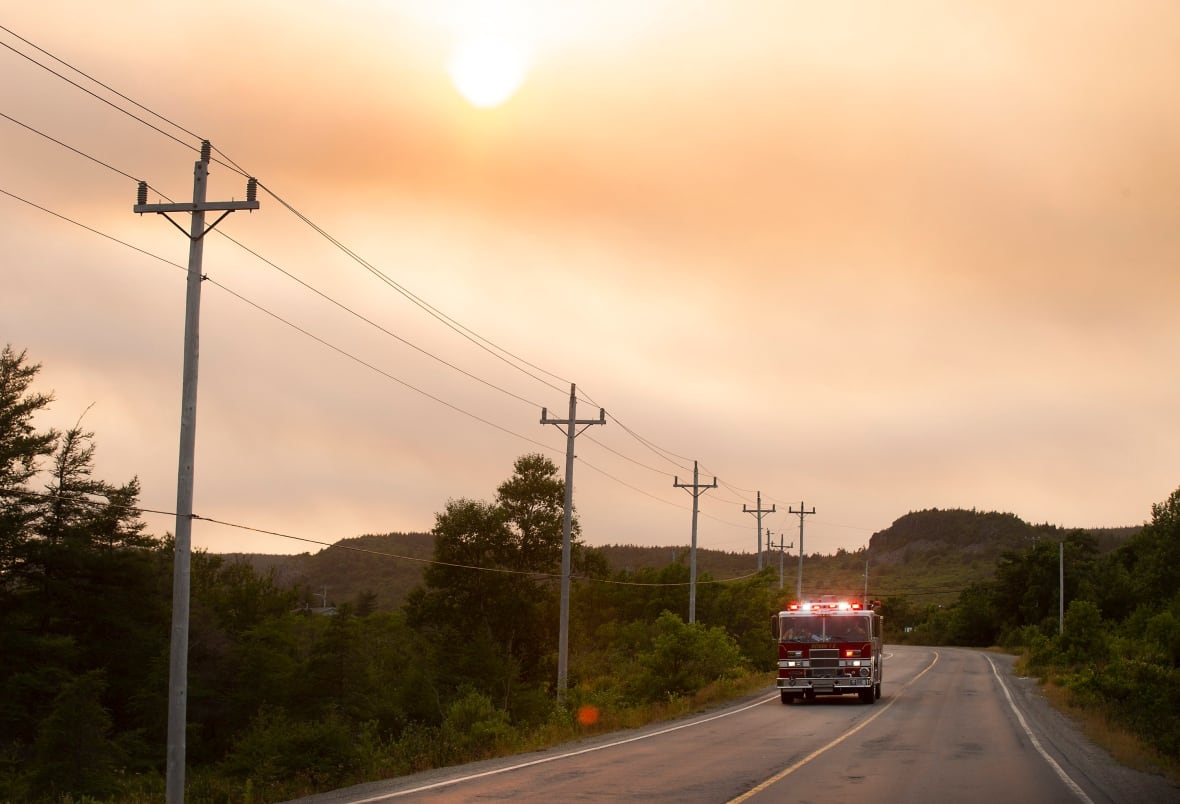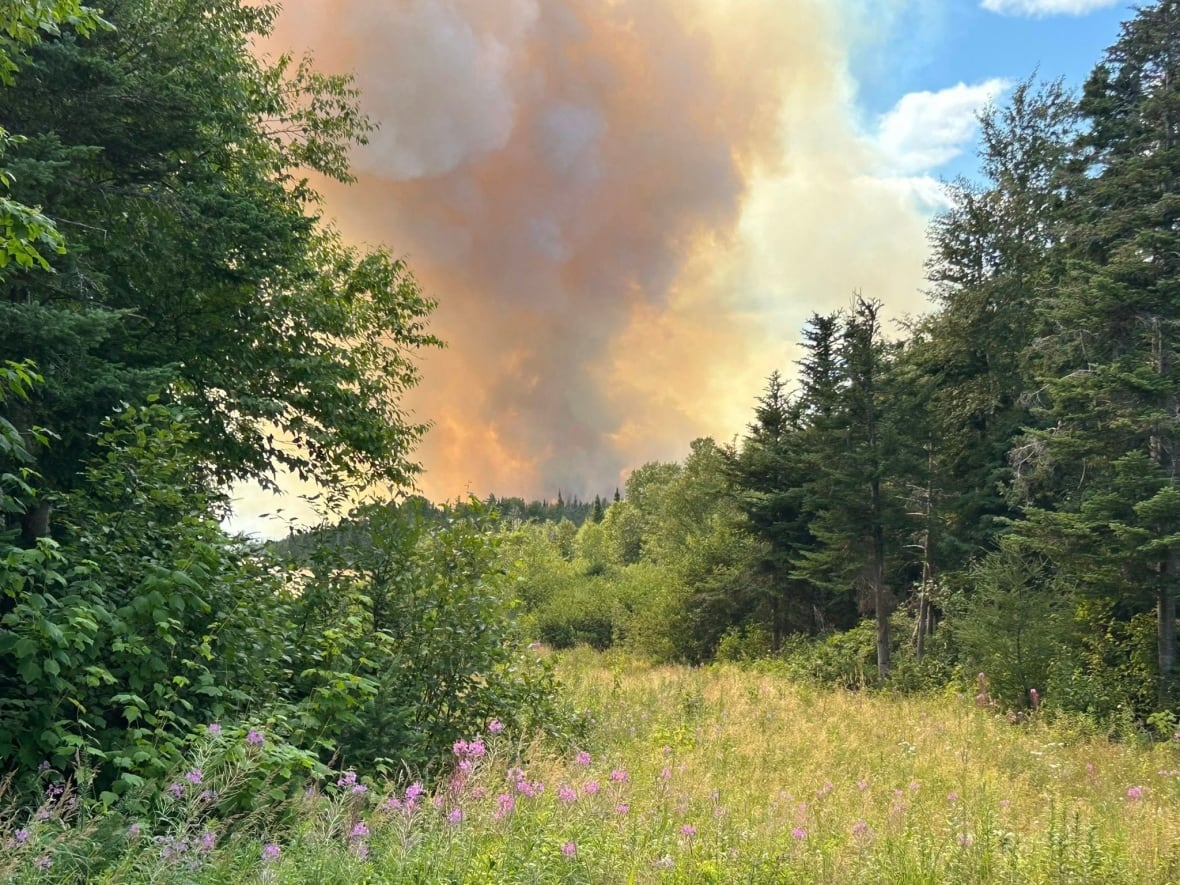C.B.N., Bay d'Espoir fires grow as N.L. mulls ATV ban
Kingston fire now 1,432 hectares, Bay d'Espoir fire at 220 hectares
Latest updates:
- Province considering ban on ATVs, increasing fines for breaking provincewide fire ban.
- Kingston fire grows to 1,432 hectares.
- Holyrood fire showed "marginal" growth overnight.
- Bay d'Espoir Highway fire grows to 220 hectares.
- Evacuation orders still in place for Kingston, Perry's Cove, Western Bay and Small Point-Adam's Cove-Blackhead-Broad Cove, sections of Holyrood and Conception Bay South.
- Evacuation alerts remain in place for Salmon Cove and Ochre Pit Cove.
- Evacuation orders still in place for cabin area off of Route 360, Bay d'Espoir Highway, extended to Rushy Pond.
- Road closure of Route 360 may be required Wednesday or Thursday.
- Backcountry travel and recreation closed for Gros Morne National Park as wildfires limit search and rescue resources.
Human caused fires are fuelling Newfoundland and Labrador's wildfire season this summer, according to the province's fire protection supervisor Jeff Motty.
Three ongoing fires have forced hundreds of people to evacuate their communities. Two are on the Avalon Peninsula in Conception Bay North and near Holyrood. A third fire in central Newfoundland, south of Bishop's Falls, was reported on Tuesday afternoon.
"We're seeing a sharp increase in the number of human caused fires and the location of the fires are not in remote areas, they're right on people's back doors," Motty told CBC News on Wednesday afternoon. "They're in what we call the wild land urban interface — so that's within communities."
Wild land urban interface fires are a common trend in Western Canada. They take place in wooded areas near residential neighbourhoods and communities.
Motty said it's a type of fire that is changing the country's wildfire seasons.

"It's the new battle zone of wildfires in Canada, and unfortunately it's on our doorsteps. It got here on May 7 when Adam's Cove was first on fire, and we lost so much on that day," he said.
The largest current fire is in Kingston, which neighbours the community of Adam's Cove where a fire in May devastated the community.
As of Wednesday evening, Motty said, the Kingston fire is 1,432 hectares. Ground crews and aerial suppression crews are on the scene.
Water bombers are currently being shared between Conception Bay North and nearby Holyrood and parts of Conception Bay South, as separate wildfire burns 50 kilometres away by air.
"The ones in Holyrood have been really focused on protecting residential areas, so they've all been making good headway today on their containment lines and will continue to do so," Motty said.
The Holyrood wildfire continues to measure at 22 hectares.
In central Newfoundland, Motty said the Martin Lake fire, near the Bay d'Espoir Highway, has grown to 220 hectares.
Three air tractors from New Brunswick and ground crews are at that location.

On Wednesday afternoon, the Department of Forestry expanded its evacuation zone to include the Rushy Pond cabin area due to ATV activity on the trails.
"ATVs have been in there kind of having a look, and we really want to keep people out of that way, keep them safe and keep our firefighters safe," Motty said.
Potential ATV ban
Earlier on Wednesday, Newfoundland and Labrador Premier John Hogan says everything is on the table to deter more wildfires from erupting.
That includes possibly banning ATVs and increasing fines for anyone who violates the provincewide fire ban.
"In my opinion those fines are way too low. They can be as low as $75 for a fine. So we will immediately be looking at increasing the amounts to serious numbers," Hogan said.
Motty expects the Martin Lake fire to grow overnight. Users of the Bay d'Espoir Highway have been advised to watch out for road closures.
Newfoundland and Labrador is requesting additional resources from other provinces to help.
Motty said he is asking for more water bombers and 20 packs of firefighters, but the extra help is dependent on fire behaviour across the country.
"Nothing set in stone because if the forecast changes, that means that they won't come," he said.
Breaking fire ban
The St. John's Regional Fire Department responded to three reports of bonfires on Tuesday, Hogan said, the same day Dempster announced the provincewide fire ban.
"I can't stress enough how important it is for everybody to pay attention to the rules in place regarding fire bans right now," he said.
On Tuesday, Nova Scotia banned hiking and driving vehicles in wooded areas due to concerns of dry conditions.
Skyann Lewis, senior compliance officer with Fisheries and Oceans Canada, later told CBC News that DFO officers in Newfoundland and Labrador won't be using ATVs for patrols in fire-prone areas.
On Wednesday night, Gros Morne National Park closed its backcountry travel and recreation sites, which include campgrounds and hiking trails, as wildfires elsewhere on the island, deplete search and rescue resources.
But the premier is optimistic about the firefighting efforts on Wednesday, pointing to favourable light winds and the assets that will be attacking the wildfires.
"But the good news is that the fire has grown inland, which is away from the communities," said Hogan of the fire in Kingston.

There have been no additional reports of more homes lost in the area, but Hogan said it's very smokey in the area so it will take time to confirm. He said some cabins in the Broad Cove Pond area could be lost.
"Again with the good news, the southern flank, which would be moving towards communities in that part of the province, is in good shape. And light winds today," he said.
The province is setting up a command trailer in the Salmon Cove area.
Hogan said three water bombers, three helicopters with buckets and a 20-member ground crew are there to fight the fire.
'Marginal growth'
Hogan said the Holyrood fire only had "marginal growth" overnight. It still stands around 22 hectares.
One helicopter, 10 ground crew members and a local fire department are fighting it. Low winds in the area are also favourable, Hogan said.
A third fire broke out in central Newfoundland on Tuesday afternoon, prompting an evacuation order for cabin owners in an area off of Route 360 — the Bay d'Espoir Highway. That area includes cabins in Martin Lake and Great Rattling Brook. The evacuation order extended to the Rushy Pond area on Wednesday afternoon. The current size of the fire is roughly 220 hectares.
Hogan said the fire is about 20 kilometres from Grand Falls-Windsor, and it should be blowing away from community. No structure loss has been reported, he added.
Hogan said one water bomber, three helicopters and three aircrafts, known as Air Tractor 802s from New Brunswick set to arrive on Wednesday, will be used to fight the fire in central.
Evacuation orders remain in place for Kingston, Perry's Cove, Western Bay and Small Point-Adam's Cove-Blackhead-Broad Cove, as well as sections of Holyrood and Conception Bay South.
N.L. Hydro says they've evacuated all of the non-essential personnel from the Holyrood generating station, and the site is secure.
"The plant is not currently generating power at this time as it is taken offline each summer to conduct annual maintenance," said Jill Pitcher, the company's public affairs liaison in an email. "As of our last update, there is no immediate risk to the Holyrood plant or our transmission lines."
Evacuation alerts remain in place for Salmon Cove and Ochre Pit Cove, so residents should be prepared to leave if necessary.

'Challenging all the way around'
Provincial fire duty officer Jeff Motty said he expects temperatures to be high and dry Wednesday.
"That's definitely worrying for everyone involved in the fire world when you do not see precipitation for a long period of time," he told CBC Radio's The St. John's Morning Show.
He said dry conditions lead to an elevated fire risk in those areas.
"The province as a whole is not really experiencing any precipitation, so it's challenging all the way around," he said.
According to the provincial fire hazard map, as of Wednesday morning the vast majority of Newfoundland is considered to be between a high and an extreme risk of fire.
He said "light" winds are good news and on Wednesday morning they will assess the fires to determine how they can safely battle them.
"Because in a moment's notice, with these dry conditions, extreme fire behaviour can change quickly," said Motty.
Despite the three wildfires, Motty said crews are feeling positive.
"I think morale has been at a high because of the amount of community support that we get," he said.

No relief
CBC meteorologist Ashley Brauweiler said special air quality statements and air quality warnings are in place in central Newfoundland to the northern Avalon Peninsula.
"The winds this afternoon will be light and generally out of the southwest, which should keep the majority of the smoke from the Kingston fire offshore," she said.
"Although smoke and poor air quality will certainly affect communities downwind on northwest Avalon today, and then may reach the northeast Avalon later tonight when the winds pick up gusting near 20 kilometres an hour."
Smoke from the Martin Lake fire will be pushed toward the central region of the island, leading to poor air quality.
Brauweiler said people should limit the time they spend outdoors, close windows and turn off HVAC systems.
"Unfortunately, there isn't going to be any relief from this heat," Brauweiler said.
"It will continue to warm up as we head toward the weekend with highs in the upper 20s and low 30s, and much of the same next week, but the humidity will increase."
Damage unknown
Mark Ploughman, a councillor in Small Point-Adam's Cove-Blackhead-Broad Cove, said he understands Tuesday was a productive day of fire fighting with good aerial support. He added there were also ground crews, made up of firefighters from across the region, who were focused on protecting structures.
He said shifting wind on Tuesday resulted in the evacuation order being extended to Perry's Cove, which brought more people to the evacuation centre.
"But overall we were advised it was a productive day."
On Wednesday winds are expected to be lower so Ploughman said he's optimistic it will be a good day for fire fighting.
He said the ground crews have done a good job of preserving structures in the community but at this time he said they don't have a good sense of how many structures could be lost.
"Until the fire is deemed under control and people can get in and do a proper assessment, we don't have a really good sense of how many structures have been lost," said Ploughman.
Download our free CBC News app to sign up for push alerts for CBC Newfoundland and Labrador. Sign up for our daily headlines newsletter here. Click here to visit our landing page.
With files from The St. John’s Morning Show and On The Go

